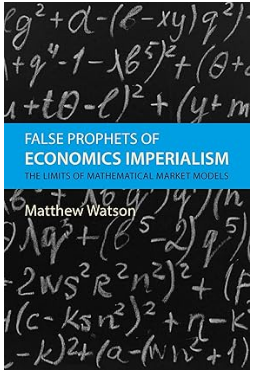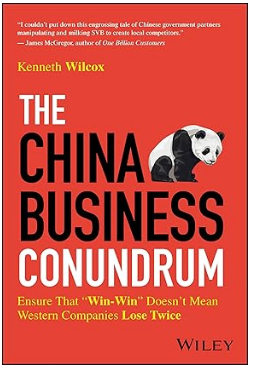 ● False Prophets of Economics Imperialism: The Limits of Mathematical Market Models
● False Prophets of Economics Imperialism: The Limits of Mathematical Market Models
Matthew Watson
Summary via publisher (Agenda publishing/Columbia U. Press)
This book studies the methodological revolution that has resulted in economists’ mathematical market models being exported across the social sciences. The ensuing process of economics imperialism has struck fear into subject specialists worried that their disciplinary knowledge will subsequently count for less. Yet even though mathematical market models facilitate important abstract thought experiments, they are no substitute for carefully contextualised empirical investigations of real social phenomena. The two exist on completely different ontological planes, producing very different types of explanation.
 ● The Little Book of Hedge Funds: What You Need to Know About Hedge Funds, but the Managers Won’t Tell You (2nd ed.)
● The Little Book of Hedge Funds: What You Need to Know About Hedge Funds, but the Managers Won’t Tell You (2nd ed.)
Anthony Scaramucci and Michael Novogratz
Summary via publisher (Wiley)
In the newly updated The Little Book of Hedge Funds by celebrated financier Anthony Scaramucci, you’ll find a crucial roadmap through the intricate world of hedge funds in the aftermath of significant financial shifts. Scaramucci breaks down complex investment strategies into understandable insights, adapting to the high-stakes environment of post-2008 and post-Covid economics. This edition is tailored for anyone aiming to grasp the pivotal changes and seize investment opportunities in the evolving landscape of hedge funds.
 ● MoneyGPT: AI and the Threat to the Global Economy
● MoneyGPT: AI and the Threat to the Global Economy
James Rickards
Summary via Forbes
AI will reshape everything. Rickards analyzes AI’s effects on the economy and offers insights on figuring out and staying ahead in a future defined by tech-driven disruption. This is essential reading for leaders who want to pre-empt and thrive through technological shifts and protect their business from AI-related risks.
 ● The China Business Conundrum: Ensure That “Win-Win” Doesn’t Mean Western Companies Lose Twice
● The China Business Conundrum: Ensure That “Win-Win” Doesn’t Mean Western Companies Lose Twice
Ken Wilcox
Summary via publisher (Wiley)
The China Business Conundrum: Ensure That “Win-Win” Doesn’t Mean Western Companies Lose Twice describes former CEO of Silicon Valley Bank (SVB) Ken Wilcox’s firsthand challenges he encountered in four years “on the ground” trying to establish a joint venture between SVB and the Chinese government to fund local innovation design—and the Chinese Communist Party (CCP) efforts to systematically sabotage the project and steal SVB’s business model. This book provides actionable advice drawn from meticulous notes Wilcox took from interviews with people from all walks of Chinese life, including Party and non-Party members, the business elite, and domestic workers.
Please note that the links to books above are affiliate links with Amazon.com and James Picerno (a.k.a. The Capital Spectator) earns money if you buy one of the titles listed. Also note that you will not pay extra for a book even though it generates revenue for The Capital Spectator. By purchasing books through this site, you provide support for The Capital Spectator’s free content. Thank you!